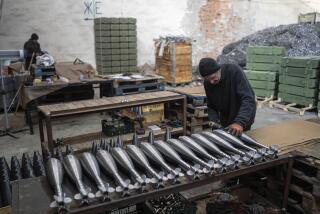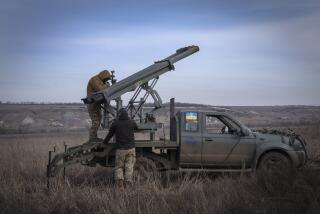Russian Military in Dire Disarray, Officials Admit
MOSCOW — Russia’s armed forces are so broke and in such a state of decay that they soon may not be able to guarantee the security of one of the world’s largest nuclear arsenals nor even defend their country, top officials acknowledged Friday.
“The worst thing of all is that I, the defense minister, am presiding over destructive processes in the army and can do nothing about it,” Defense Minister Igor N. Rodionov said at a news conference. “Russia may approach a threshold soon beyond which rockets and nuclear systems become unmanageable.”
In hopes of receiving more than $250 million in overdue payments, Rodionov said, he has complained in writing about the “horrible state” of the Russian armed forces to President Boris N. Yeltsin, whose own precarious health continues to raise security concerns that were underscored when it was announced Friday that a U.S.-Russia summit planned for Washington has instead been moved to Helsinki, Finland.
Yuri M. Baturin, Yeltsin’s defense advisor, joined Rodionov on Friday in lamenting the state of the military: “If we fail to cope with these problems in the next two or three years, it will be hard to expect our defense to continue to exist.”
The unusual concession by the two defense officials followed months of reports from the field about the sorry plight of the once-mighty 1.7-million-member army. The government is so far behind in paying wages that some soldiers have suffered from malnutrition while others trade ammunition for food and vodka. More than 110,000 members of the armed forces have no housing. Military suicides rose to more than 400 last year.
In recent months, Rodionov said, the army has received only 55% of the money budgeted for food; half its allocation for equipment; and just 6% of its funds for medical supplies.
The war in Chechnya, the southern separatist region, exhausted much of the military’s resources while providing stark evidence of the poor fighting ability of Russian troops. Now, even the top brass question whether bitterness and dissension in the ranks could produce political instability that would pose a threat to the government.
“In this morale and equipment situation, uncontrollable processes can develop both in the hardware and among servicemen,” the Russian defense chief said, adding that military leaders “have to stand idly by as the army and navy are disintegrating.”
The comments of Rodionov, many of them made to Russian reporters Thursday, and the remarks of Baturin on Friday came as Russia is attempting to dissuade the North Atlantic Treaty Organization from expanding its forces into Latvia, Lithuania, Estonia, Poland, Hungary and the Czech Republic.
In recent days, top Russian officials have warned that an expansion by the Atlantic alliance into the former Soviet Bloc could trigger a nationalist, anti-Western backlash in Russia.
The high-level admission that the military is in dire disarray could signal a new Kremlin strategy to persuade the West that the Russian army is so feeble that there is no need to expand NATO.
“We are continuing to say that we are opponents of NATO expansion,” said Rodionov, a veteran general who was appointed to his post last year and only recently, through a ruse of sorts, was retired and then became modern Russia’s first “civilian” defense minister.
“Perhaps NATO wants to impede our reforms, even our democratic transformations,” he said. “It is logical to put this question. Perhaps they want a return to the Cold War confrontation? But we are trying to avoid this by all means.”
Still, the prospect of a disintegrating Russian army might increase the desire of some nations in close proximity to Russia to join the Western military alliance.
“The Russian army does not get enough money to feed the soldiers and dress them all in good uniforms, not to mention the level at which the arms are maintained,” said Sergei N. Yushenkov, a retired colonel and a deputy in the Russian parliament. “In such conditions, it seems, there is no need for NATO’s expansion to the east. But the army also lacks overall control and is characterized by low discipline, so the West needs to secure itself from such a dangerous chaos and anarchy.”
U.S. officials in Washington say reform of the military is one of their top priorities for Russia because of the importance of bringing stability to the region. With almost 2,000 generals, the Russian armed forces also have more soldiers and more equipment than their American counterparts. But Russia allocates only one-tenth what the United States does for its defense budget, Baturin said.
And Moscow invests little money in high-technology weapons systems. Because of a shortage of satellites, complained Rodionov, “we cannot keep track of what is going on outside Russia for hours a day, while the United States is following us 24 hours a day.”
Russia’s three-stage plan for overhauling the military calls for reducing the number of troops and equipment over the next four years. Yeltsin has already decreed that the army be reduced by 200,000 soldiers to 1.5 million by Jan. 1. Over the next 15 years, the military would invest money in better training and technology to build a smaller, more mobile and more professional army, along the lines of the U.S. military.
But in a veiled criticism of Yeltsin, the defense minister--who apparently conducted his Friday news conference with the president’s advisor to put to rest reports that the two have been battling over the pace of military reform--said the plan for fixing the armed forces is not being put into action because of a lack of support at the top levels of government.
“We have a program,” he said, “but no political decision, no concept and no political will to carry it out.”
More to Read
Sign up for Essential California
The most important California stories and recommendations in your inbox every morning.
You may occasionally receive promotional content from the Los Angeles Times.










